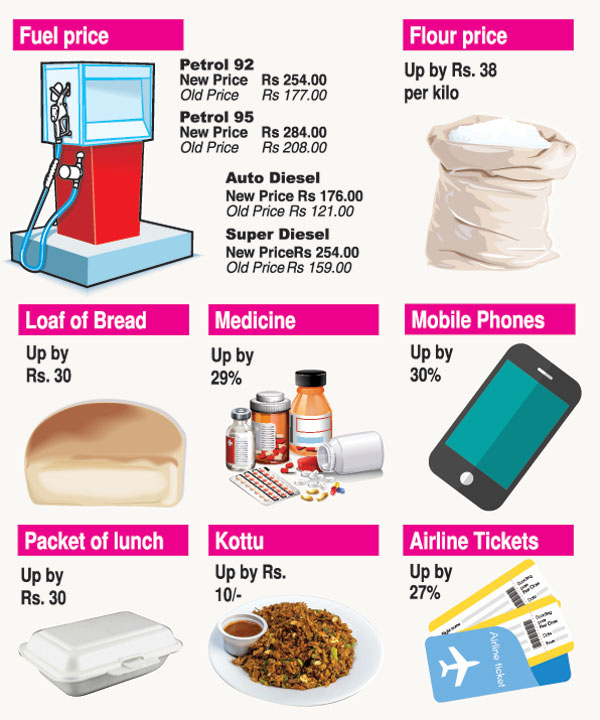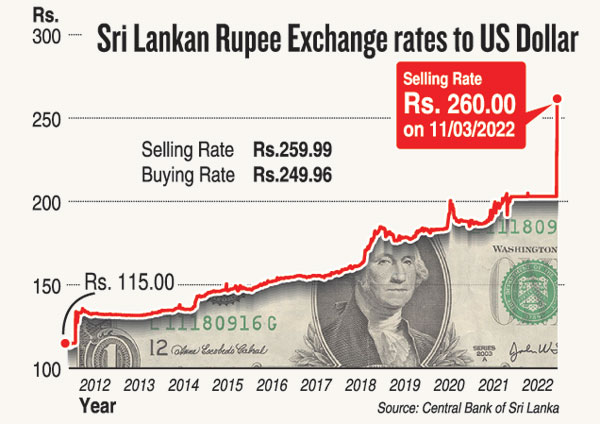News
Floating dollar draws mixed reactions from businesses
 The Central Bank’s recent decision to float the Rupee was met with mixed reactions as some business owners hailed the move while others claimed that it was too little too late.
The Central Bank’s recent decision to float the Rupee was met with mixed reactions as some business owners hailed the move while others claimed that it was too little too late.
“From an entrepreneur’s perspective, the decision to float was a good move,” noted Randheera Herath, Working and Foreign Affairs Director at Kandyan Spices (Pvt) Ltd.
He noted that exporters had been struggling to deal with a massive crisis due to the dollar shortage, while increases in local prices were driving up product costs and thereby making it competitively difficult to match global prices. “For example, a kilo of pepper in the local market last month was Rs.1,250 and with at least a Rs. 150 profit margin, our export price would be Rs. 1,400 which would translate to around USD 7 at an exchange rate of Rs. 200 a dollar.”
Competing countries like India, Vietnam, Brazil were exporting pepper at a standard price of USD 4 a kilo and this encouraged most European and Middle Eastern buyers to abandon Sri Lanka.
Mr. Herath noted, however, that after the Government’s decision to float the dollar and raise its value to Rs. 250, pepper exporters were able to offer the a kilo at around USD 5.6.
“If we could get to USD 5 mark, I think most exports will be back on track,” he said, pointing out that the high quality of Sri Lankan spices gave them an edge over other countries. “So importers wouldn’t mind paying an extra dollar for Sri Lanka’s pepper.”
Hotel Association President M. Shanthikumar said the floating of the dollar was the need of the hour.
Since a floating currency reflects the real economic state, this move should probably have come long before the economy plunged into where it is today, he said.
“On the flipside this is also going to drive our costs up exponentially,” he pointed out. Operational costs of the tourism sector were bound to rise since they were mostly dependent on imported items such as liquor. “It is not only the rising dollar, but also fuel price increases add to the costs. For instance, prices of vegetables that come from outstations would go up due to the rise in transport charges,” he said.
Prof. Rohan Samarajiva, Founding Chair of LIRNEasia, said the Government had no alternative but to increase the fuel prices, using a formula or not and this would have major effects. He noted that radical devaluation would send price shocks throughout the country but the dollar crisis could ease when more foreign earnings started flowing in.
When imports become more expensive, consumers would be pushed into local alternatives and over time this could reduce imports, he said.
The professor said that it was foolish to waste reserves defending an artificial rate especially when the country’s foreign reserves were at a historical low. “It’s a pity that by its ill-conceived actions to artificially hold the dollar at LKR 200, the Central Bank did enormous damage to the economy and to the people of this country,” he said.
According Prof. Samarajiva, the realistic exchange rate alone would not suffice. Also needed are urgent fiscal measures such as quick debt restructuring, a halt to the forceful conversions of remittances and an increase in the Central Bank’s policy rates.
Previn Weerakoon, a 28-year-old tech industry sales professional, said: “I think the Government and the Central Bank are on two different pages,” noted
He said the decision to float the dollar without raising interest rates caused confusion. “Since almost everything we consume is imported, prices will shoot up,” he said, adding that inflation was rising extremely disproportionately to bank interest rates which are still at 4%. People will then opt to spend more and this will result in more demand causing more inflation. “The ideal scenario would be for the Government to raise interest rates while floating the dollar. Such measures will even attract more foreign investments into the country and help our reserves grow.” 
As soon as the float was announced, some companies put out announcements claiming that the salaries they pay to their employees will be “pegged” to the dollar or euro.
“My company pegs our salaries to the dollar, so we’ll be okay but most people will suffer especially since their salaries will more or less remain the same,” Mr. Weerakoon said.
Freelancers working on international projects noted that the move had been beneficial to them since their quoted prices were now worth more in Sri Lankan rupees.
But some business owners noted that confirmed or completed projects did not necessarily bring profits because they had to pay at the new dollar rate for the supplies they bought on credit.
International students also bemoaned the sharp overnight increase in costs during the exam season. “The sterling pound went up by Rs. 60 between March 8 and 11, so I had to pay more rupees to buy pounds to pay my exam fees,” noted a student following a United Kingdom degree course from Sri Lanka. Another noted that planning for expenses was “so depressing” because parents were already overburdened with sharp cost-of-living increases and little or
no salary increments.
| Foreign job agents see good and bad of floating “This is turning out to be a huge problem for us,” noted M.F. Marrikkar, President of the Association of Licensed Foreign Employment Agencies (ALFEA). He said ALFEA sought from the Government a fair fixed exchange rate. “We wanted value for the money we earned,” he said. The impact of the float has been severe on the licenced foreign employment agencies as airline tickets have seen shape increases. “Those who go abroad to take up jobs as domestic aides get sponsored. Therefore, it isn’t usually an issue, but people going out for white-collar jobs air travel would be more expensive,” he said. “Operational costs are increasing in every way. Even stationary supplies have increased by almost 100 percent over the past few days. While migrant workers who want to send their remittances to Sri Lanka welcome the floating rate, the supply of migrant workers will be affected because of the extreme costs,” Mr. Marikkar said. He added that as the rate rose to Rs. 250 a dollar at banks rates, the dollar was being sold at Rs. 290 in the black market. As such, banks were still finding it difficult to issue dollars, he said. | |
The best way to say that you found the home of your dreams is by finding it on Hitad.lk. We have listings for apartments for sale or rent in Sri Lanka, no matter what locale you're looking for! Whether you live in Colombo, Galle, Kandy, Matara, Jaffna and more - we've got them all!

